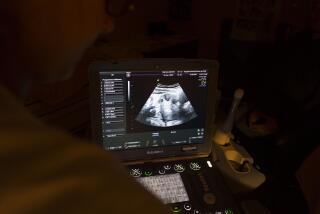PREVIEW / FETAL RESEARCH BILL : Waxman Seeks to Restore U.S. Funds for Human Cell Studies
WASHINGTON â In a move almost certain to reignite the smoldering battle over fetal tissue research, Rep. Henry A. Waxman (D-Los Angeles) intends to introduce legislation to overturn the ban on federal funding for such work.
Scientists believe that fetal tissue research holds extraordinary promise for the treatment of an array of serious illnesses, including Parkinsonâs disease, Alzheimerâs disease, diabetes, Huntingtonâs disease, leukemia and spinal cord injuries.
But the anti-abortion movement charges that such research is built on exploitation of the unborn. Federal funding for such research has been unavailable since April, 1988, when the Ronald Reagan Administration instituted a moratorium.
BACKGROUND: Fetal tissue has been used in research since the 1930s, often to develop self-sustaining cell lines used in the diagnosis of disease and the production of human vaccines. Fetal cells have special advantages because of their rapid growth and adaptability. In fact, the discovery of the polio vaccine in the 1950s was based on cultures of human fetal kidney cells.
Fetal tissue research has taken a new turn in recent years. The most recent focus has been on experimental surgery involving the transplantation of fetal cells--healthy cells that it is hoped will assume the functions of diseased or defective cells in the body.
After the 1988 research moratorium was imposed, the National Institutes of Health convened a special independent advisory board of medical experts and ethicists to evaluate the issues and recommend whether the ban should be lifted or made permanent.
After an intensive investigation, the panel declared the work acceptable and urged that it continue. In fact, some private research does continue but only on a small scale.
The committee declined to take a position on the morality of abortion. It recommended that safeguards be developed to guard against encouraging women to undergo abortions to provide fetal tissue, including one to prohibit women from designating how tissue from their abortions could be used.
Otis R. Bowen, Reaganâs secretary of the Department of Health and Human Services, was prepared to end the ban but was stopped by the incoming Bush Administration, according to knowledgeable sources. Louis W. Sullivan, the current health and human services secretary, later said he would maintain the ban.
THE ARGUMENTS: Supporters of the ban, most of whom belong to the anti-abortion movement, insist that fetal tissue is obtained from an immoral procedure and thus is tainted and should not be used, no matter how lifesaving it may prove.
The Administration argues that the use of fetal tissue for research âcould provide encouragement to a woman who is on the edge trying to decide whether to have an abortion,â Sullivan said recently.
Opponents of the ban, most of whom are members of the scientific and medical research community, argue that the fetal tissue could be put to good use to help others. Now, nearly all tissue from the estimated 1.5 legal abortions performed annually in the United States is cremated or discarded.
âI just think itâs a travesty to not allow research that could save lives to go forward,â says Waxman, chairman of the House Energy and Commerce subcommittee on health. âI donât see this as an abortion question; I see it as a freedom for research matter.â
OUTLOOK: The legislation will certainly be opposed by the anti-abortion movement and is not likely to be approved by President Bush. Sullivan said that âthe chances of the President vetoing that bill would be quite high.â
Waxman concedes that âitâs going to be a difficult fight,â saying that passage will require an all-out lobbying effort from virtually all disease organizations that stand to benefit from the research.
Times medical writer Janny Scott contributed to this story.






